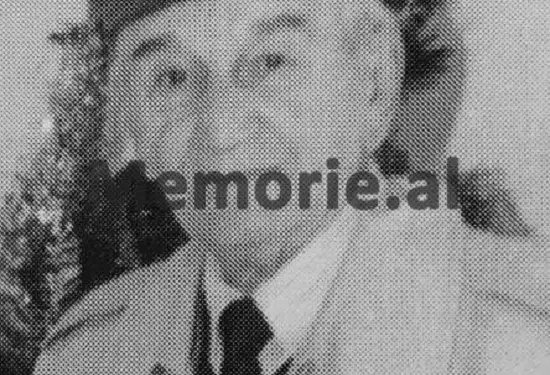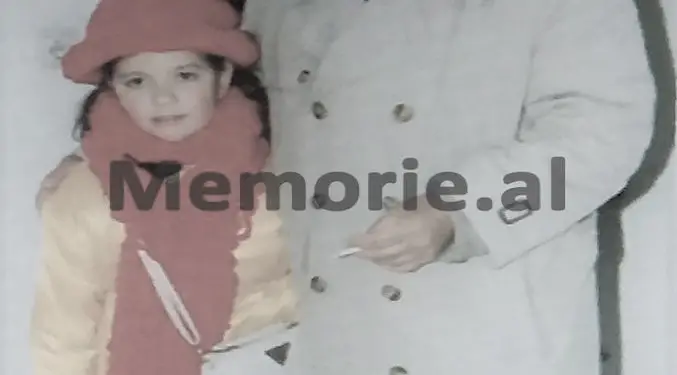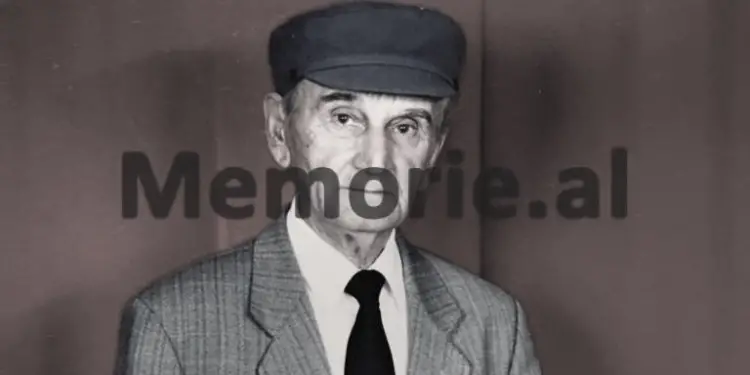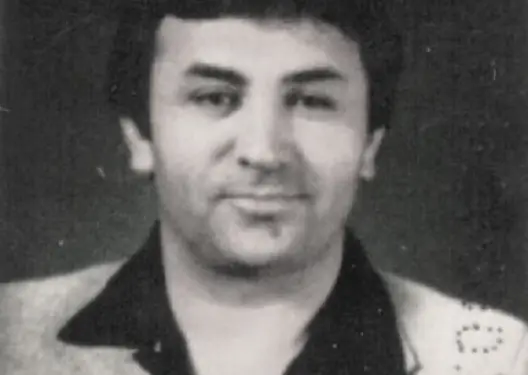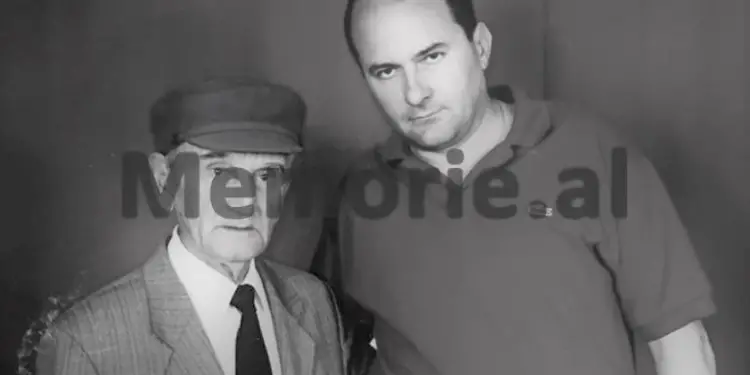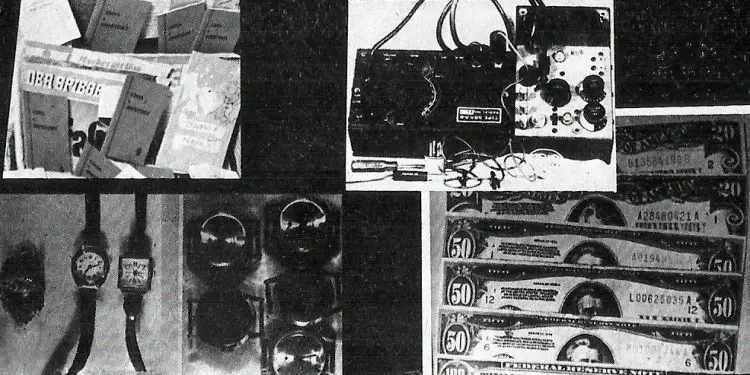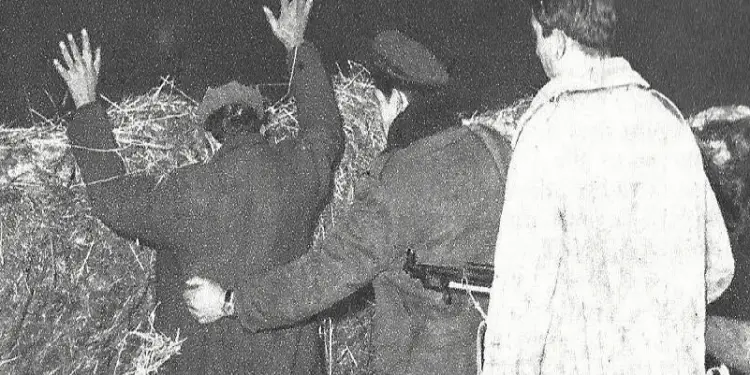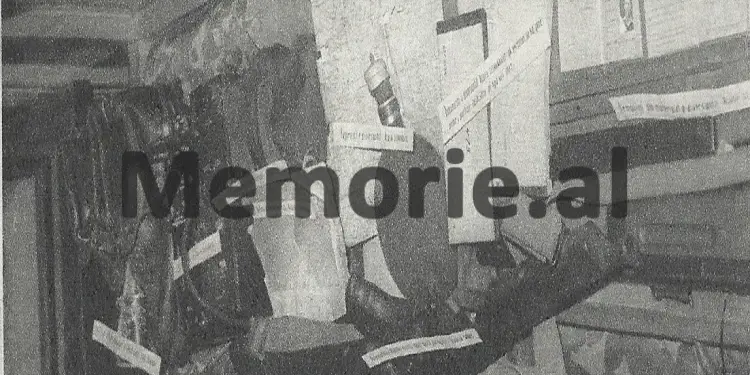Dashnor Kaloçi
The fourth part
Memorie.al/ publishes the unknown and rare story of Avdul Hakan Banushi, originally from the village of Golem in Gjirokastra, who during the period of occupation of the country (1939-1944), unlike his entire family who lined up in the ranks of partisan forces, he joined the nationalist youth organization “Balli Kombëtar” in the city of Durrës, where he was arrested by German forces in October 1943 and together with 73 other people, were initially sent to the German camp in Prishtina, and then to the mass extermination camps at Landsberger and Dakau, from where he could only be released in 1945, after the intervention of Anglo-American forces. Banushi returned to Albania in 1945, after staying for some time in the Reggio-Emilia camp in Italy, (where at that time were also some of the main leaders of ‘Balli’ and ‘Legality’ led by Mit’hat Frashëri and Abaz Kupin) and his arrest a few days after arriving home, after at Lapraka airport, partisan guards found a letter given to him by the former Prefect of Gjirokastra, Rasim Babameto, while they were in Reggio-Emila. Banush was sentenced to 18 years in prison, accused of being an “agent of the Anglo-Americans” and released in 1961, where he did not spend much time with his family in the village of Golem, after being arrested again while interned in the town of Fier, from where he managed to escape from prison the first night and fled in the direction of Gjirokastra, where he crossed the state border and went to Greece, where he soon gained political asylum in the United States. Banushi’s engagement in the ranks of the Albanian political diaspora in the West, as a member of the “Free Albania Committee”, where in 1973, after being trained by the CIA, he came several times with secret missions to Albania, in order to carry out assassinations Enver Hoxha in the big parade of November 29, 1974, on the occasion of the 30th anniversary of the liberation and his arrest in 1975 near the border of Hani i Hotit, after a trap set by the Minister of Internal Affairs, Kadri Hazbiu , from where he would then be isolated for two years in the cells of ‘Ward 313’ in Tirana Prison and then in Burrel, from where he could only be released in early 1991.
“When the first contradictions of official Tirana with the People’s Republic of China started in 1972-’73, we became even more confident that the time had come to organize concrete measures for a possible landing in Albania. After talks between the leaders of the “Free Albania” Committee and Mr. Joseph Shisko, Deputy Secretary of State, and Major Thomas Smith, who covered Albanian political emigration to the United States, in January 1974, the presidency of The organization “Albanian Anti-Communist Resistance Front” decided to send to Albania the first group, which would consist of five people. Among the main tasks that the group would perform were: ‘Meetings with people dissatisfied with the communist regime, the demolition of the Stalin and Lenin monument in the center of Tirana, the blowing up of the headquarters of the Central Committee of the ALP, the distribution of anti-communist propaganda materials, which had been prepared in New York, etc. It was decided that the first group would be led by me, as I was acquainted with the contingent of families persecuted by the communist regime, where we would initially rely. In addition to me, this group also included: I. Rrushiti, N. Banushi, I. Lame and A. Sula. After some intensive preparations we made on a secret basis, we finally set off on the plane that would traverse the route: New York – London, – Amsterdam – Rome – Athens. When we arrived in the Greek capital, we took refuge in the Hotel “Atlantik” and the next day we went to the military base of Preveza, where the colonel who was waiting for us supplied us with weapons consisting of five automatic weapons, five pistols, 20 grenades, 6 kg. dynamite, capsules and mechanical devices for detonating them, swimwear, a radio receiver and transmitter, as well as many other ammunition and equipment. After arranging these in a safe place, I talked to the colonel about the possible routes we had to follow to enter Albania and at seven o’clock in the evening we set off in a small speedboat run by three sailors and after a few hours we arrived in the coast of Ksamil ”.
This is how Avdul Hakan Banushi, originally from Golem, Gjirokastra, remembered the beginning of the “Albanian adventure”, who told us for the first time some of the most sensational events of his life, which took place in 1974 – ’75, when he, at the head of a commando group launched by the United States of America, entered Albania several times with secret missions.
Who was Avdul Banushi and what is his past? Why was he interned in the Nazi concentration camp in Dakao, Germany, and how did he manage to escape? How did he return to Albania in October 1945 and why was he sentenced to 18 years in prison, being accused of being an agent of the Anglo-Americans? How did he manage to escape from the Fier Branch of Internal Affairs in the first days of August 1961 and how did he cross the border into Greece? What was asked of him in Athens and how did he gain political asylum in the United States? Who were the Albanian anti-communist leaders who organized the “Throne of Anti-Communist Resistance” and why did the “Albanian adventure” of Abdyl Banushi and the assassination of Enver Hoxha in the big parade of the 30th anniversary of liberation on November 29, 1974 fail? Who was the man who accompanied and betrayed Abdyll Banushi on his last mission in Albania, which caused him to fall alive into the hands of the Albanian border forces near Hani i Hotit, from where he would be isolated in the horrific Burrell prison, until the fall of the communist regime in 1991? Regarding these and many other events and facts, we know the exclusive interview given to us by Mr. Banushi, a few years ago, which will be in six numbers in a row.
Continued from the previous issue
Mr. Banushi, how did you come to Tirana and where did you take refuge?
From Durrës to Tirana we came by train and immediately went to our safest base which was located in a basement at the “Shallavre” palaces in the Bineri family, which was originally from Gjirokastra. We came there with a recommendation we had long ago from Captain Rrapo Bineri, a former officer of the Monarchy and the main exhibitors at the Legality Headquarters during the War, who had fled Albania since 1944 and lived as a political emigrant in Rome.
Who lived in that house?
The families of brothers Sami and Selim Bineri lived in the two basement entrances. Samiu had been the commander of a partisan battalion during the war, but was later demobilized and sentenced several times to political prison. While Selimi, if I am not mistaken, worked as a driver. At the time we were sheltered there, as far as I remember Sami had been arrested and executed, ostensibly for a deficit. We had connections with his grandmother, Safon, who sheltered us inside as “friends from her village.”
How long did you stay in that house and what did you do there?
In that house in the late hours of the night we had a meeting with some of our people who were called by one of the boys of the house and came there one by one. During the meeting, one of the newcomers (I. Begeja) who was the head of another base spoke harshly to us, saying: “You have been silent for 30 years. You have been forgotten by your families and no longer by the people. You have given in to money and you are divided into several parties, it seems that you have the mind to occupy the seats. “We have nothing to do without you. We have inadvertently succumbed to dictatorship because we want to feed the children.”
What answer did you give to Begeja?
After listening to him to the end, I said to him: “We have left America and come here to the wolves mouth. Let this be the beginning to create the links of a long anti-communist chain. Remember that we abroad are working politically, morally and economically “. Then we discussed for a long time and that night we decided to create a leader of the organization “Resistance Front” based in Tirana, which would perform all the tasks it would take from abroad. Before we left, we left there 2000 USD, 7 kg of DT dynamite, propaganda materials, a radio transmitter that we had with us, the give-and-take codes as well as a letter of protest, addressed to foreign embassies in Tirana, where they were called for the severance of diplomatic relations with Albania. That letter was prepared in many copies and would be thrown overnight in the courtyards of the main embassies in Tirana.
From there, where did you go next?
In order not to compromise that secure base of the Bineri family, we left the next day and went to another base to the I. Begeja family, which belonged to a cousin of Halim Begeja, where we stayed for three days. Then we went to the family K. Gaba and then from Tirana we traveled by train to Lushnje and then Vlora, where after drinking a coffee at the Hotel “Sazani”, we took refuge with the family of Kudret Kokoshi. From Vlora we went to Dukat to the family of M. Koshena, who had been in prison with me in the Tërbuf camp. In Dukat we met with the almighty of the area and drank a coffee with him at the village club. We then left Dukati and went to Kasamil, where by radio we got in touch with the center which sent us the submarine and we all went back to base.
Was this mission of yours considered successful?
Undoubtedly it was one of the most accomplished missions ever done in Albania.
Who gave this rating?
Of course, the leadership of the “Anti-Communist Resistance Front”.
After this mission, what was your next activity?
From the beginning of May 1974, in the framework of the actions that we of the organization “Front of Resistance” had undertaken, I decided to go to Italy and France, and drop bombs on the Albanian embassies that were accredited there.
What was the purpose of this action that can be called terrorism?
Not the purpose of the action I had undertaken to carry out by dropping bombs on the Albanian embassies in Rome and Paris had any terrorist character. By no means did I want to convey that I recommend for the mother to be inactive.
But what was your goal?
The only purpose of that action was for us to make noise and show the anti-communist families who were in Albania and those who were dissatisfied with the regime of Enver Hoxha, that there were people outside who were acting against the communist leadership of Tirana. So in a word, to raise hopes in the contingent of politically affected families, where we hoped to have our main base where we would rely in case of an intervention and landing in Albania.
When did he carry out the bombing action at the Albanian embassy in Rome?
On May 20, 1974, my four friends and I flew from the United States to Rome. There we were received by Sabaudin Haznedari, a political emigrant who had fled Albania years ago and settled in Rome where he had married an Italian and was engaged in the washing machine trade. Sabauddin’s house was our base because he was a member of the Resistance Front.
Sabaudin Haznedari, is he the one who came to Albania with the group of Xhevdet Mustafa on September 26, 1982?
Yes, he was killed in Lushnja, if I am not mistaken, on September 26, 1982, when Xhevdet Mustafa was also killed.
What did you ask Sabauddin Haznedar?
We told Sabaudin to send us to the Albanian embassy the next day in order to study the place to see how we could get inside its perimeter wall, from where we would drop the bomb. He was very willing and the next day took us to where we saw only one Italian carabinieri guarding its main entrance. Sabaudini told us that he had been to the embassy premises several times for document problems and that the families of the embassy staff lived from the back of it. We needed this information in order for us not to hit where the families of the embassy staff lived. Adjacent to our embassy was the Tunisian embassy, which was not guarded by police guards. After thoroughly studying the whole place around it, we headed back to Sabauddin’s house.
When did you go back to perform the action?
That night around 12.00, Haznedar and I left the house and went back to our embassy. The friends of the group left them outside to guard, while Haznedari and I entered the courtyard of the Tunisian embassy and through its courtyard, we entered the courtyard of the Albanian embassy where we saw two vans and two cars parked. Since we could not enter the embassy, because the guard dictated to us, I approached the front wall of the embassy where I placed a package of 3 kg. American dynamite TD, which was used to fill rockets with mechanized capsules. It had a bursting mechanism, which acted on the temperature created by the flow of a liquid. After placing the dynamite package there, we immediately went outside, without being dictated, and took two taxis back to Haznedar’s house.
When did the dynamite explode and what happened next?
The dynamite exploded around three o’clock at night, just as we had set up the mechanism and the loud noise we heard too. The announcement of the bombing of the Albanian embassy was given by all televisions in the morning. The front wall of the embassy had collapsed and there was a great commotion. In the morning we left the house and went by ourselves to the scene where there was a real commotion. After the dynamite exploded, four ambulances and some fire engines immediately went there. There we saw the Albanian ambassador who had gone out alone with a canoe, who hit his head with his fists and cursed in Italian. At that moment, the Commander-in-Chief of the Gendarmerie came and kicked the guard carabinieri, shouting at him why he had not prevented it.
What did you do next?
From there we left in the direction of the airport, where after we bought the newspapers that had all the news of the embassy, we boarded the plane of the line “Alitalia” and arrived in Athens. There we heard on the radio the protest of the Albanian Prime Minister Mehmet Shehu, who considered the act of dropping the bomb as an act of the fascists. After that, from Athens we returned to the US.
But after that action, did you have other plans to drop bombs on Albanian embassies?
After that action, we decided to do the same with the Albanian embassy that was in Paris. In September of that year, together with the group I led, we came to Preveza to get the dynamite we needed to carry out the action. There we held a meeting where we specified the actions we would take to drop the bomb, having been to Paris before and had explored the whole country. Knowing that the Albanian embassy in Paris was surrounded by high bars and it was impossible to get inside to put the dynamite, we took a grenade launcher (anti-tank), which we dismantled and put in a tourist bag. Since we could not put him on the plane, we went from Preveza to Athens, where we took the train and traveled to Paris. There we took refuge in the hotel “Viktor Hygo”, which was very close to the Albanian embassy.
Who took part in that action and how did you accomplish it?
At one o’clock in the morning, P. Luma and I received the bag where we had packed the grenade launcher weighing 5 kg and we left the hotel and went to the Albanian embassy, which was not more than a km. from there. There was only the guard at the main door as we exited behind the embassy, where there was a narrow alley and some villas. Seeing that the guard could not see us there, I pulled the grenade launcher out of my bag and mounted the projectile in its muzzle. After resting it on my shoulder, I took the sign in the direction of the first floor window, where we knew it was an office and no one lived there. After that I did the shooting and the shell fired at the target, making a lot of noise. After that we left the other side of the embassy and by different routes, we arrived at the hotel. Early in the morning, all the televisions broadcast the embassy event, where there was a big commotion and fire trucks and ambulances had gone. After we left the hotel, we bought three newspapers “Lë Mond” that we would take to the Committee “Free Albania” and we did not go to the embassy to see that we were afraid of being dictated. After that we returned to the hotel, where we stayed another two days.
Did you fall in the eyes of the French police or secret services, as the perpetrators of that event?
We had no problems and did not cause any suspicion to the French police. Even during the meeting we had in that hotel with Prof. Seit Kryeziu (Chairman of the Agrarian Party of Kosovo) and Sadik Premten, they did not know anything and asked us who did those actions! We told him that we had come as tourists to France and knew nothing of who their perpetrators were. Then, from Paris we went to New York, where everyone had heard the news of the bombing of the Albanian embassy in Paris.
What did they say to you in the Presidency of the “Resistance Front?”
“After we reported on the action, the entire Presidency of the Committee” Free Albania “and the” Resistance Front “congratulated us and called it a successful action” ./ Memorie.al
The next issue follows




